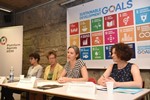Social Watch E-Newsletter - Issue 342 - March 15, 2019
Published on Fri, 2019-03-15 13:26
 |
| Issue 342 - March 15, 2019 |
|
|
Social Watch reports
Spotlight report on the 2030 Agenda
|
|
|
| |
|
| |
Switzerlandd attracts profits generated elsewhere
|
| |
|
| |
 |
The report on Switzerland by the NGO coalition Alliance Sud emphasizes the negative spillovers of policies: “Swiss foreign economic policy and its international financial and fiscal policy are still far from taking sufficient account of the requirements of the 2030 Agenda.” After a visit to Switzerland, UN Independent Expert on foreign debt and other financial obligations Juan-Pablo Bohoslavsky drew attention in a report to the Human Rights Council to deficiencies in the prevention of unfair financial flows and problems in the area of international corporate taxation: “The existing Swiss tax privileges for the foreign profits of multinational corporations ... create massive incentives for profit transfers to Switzerland and help to deprive developing countries of potential tax revenues in the hundreds of billions.”
Alliance Sud observes that “in the planned Swiss corporate tax reform, the Federal Council plans to abolish the previous tax privileges, but intends to replace them with measures that will ultimately have the same effect: for multinational corporations it will remain attractive for tax purposes to transfer profits from abroad - not least from poorer countries - to Switzerland”.
The Swiss CSO report criticizes especially the allocation of resources at national level: “In 2017 the number of people affected by poverty in Switzerland has risen for the second year in a row and public funds in support of the poorest are being cut. This is unacceptable, given a government surplus of CHF 5 billion.” Read more
|
| |
|
| |
|
| |
Peru is unable to implement
|
| |
|
| |
 |
Peru was affected by natural disasters more than a year ago, when heavy rains and floods affected 21 of its 25 departments. As of May 2018, thousands of families still lived in tents and many schools and hospitals had not recovered completely. In fact, many families still have not recovered their houses, destroyed by an earthquake in 2007, more than ten years ago!
Peru is part of the “Ring of Fire” around the Pacific Ocean, prone to earthquakes and volcanic activity. It is further vulnerable to the climate change-induced alterations in ocean currents, causing floods in the north of the country and drought in the south and centre. According to the report by Grupo Red de Economia Solidaria del Perú (GRESP) and the Intercontinental network for the promotion of social solidarity economy (Ripess) “lack of planning in the use of land for housing and criminal-led occupations of unsuitable terrain to set up slums make the problem worse.
Captured by corruption, the Peruvian state is too weak to implement public policies, risk prevention, emergency assistance or rehabilitation and reconstruction.” In 1990, when neoliberal policies started to be implemented, poverty affected 24 percent of the population. The 2018 household survey situates income poverty at 21.7 percent. “Peru has sold at throw-away prices its state-owned enterprises and given away all its natural resources to lower poverty to less than three percent” comments NGO leader Héctor Béjar. “The 2030 Agenda, from this perspective, looks like a beautiful but unreachable utopia.” Read more
|
| |
|
| |
|
| |
(Re)municipalization of water
|
| |
|
| |
The push for greater private sector involvement in the implementation of SDG 6, the Sustainable Development Goal on water, flies in the face of growing evidence that the privatization of water and sanitation has been detrimental, especially to the most marginalized and vulnerable communities in the world.
Evidence shows that private investors have largely ignored the most underserved regions of the world while favouring more lucrative markets requiring less capital and promising greater returns. For instance, in Chile, where 95 percent of the water and sanitation services are in private hands, the State invested significant public funds in order to achieve extensive coverage before it was sold to private investors with the promise of a 7 percent return. Corporate utilities operating in Chile have not expanded networks outside profitable urban centres. Read more
|
| |
|
| |
Social Watch publishes country reports 2018
Social Watch coalitions around the world are contributing their assessments and reports to the global Social Watch report 2018 on the national implementation of the 2030 Agenda. While circumstances and capabilities are unique in each country, common threads emerge: Inequalities, often exacerbated by the international policy framework, are not being reduced, poverty is underestimated or hidden but not eradicated, sustainability is sacrificed to extractivism.
The Social Watch national platforms are independent coalitions of civil society organizations struggling for social and gender justice in their own countries. The Social Watch network has been publishing since 1996 yearly reports on how governments implement their international commitments to eradicate poverty and achieve equality between women and men.
|
| |
|
| |
|
| |
|
| |
Imagining Gani
|
| |
|
| |
 |
Under the motto "Imagining Gani", Social Watch Philippines gave tribute last March 11 to Isagani Serrano, who passed away last February 22nd. Gani was a Co-Convenor of Social Watch Philippines and a contributor to the national Social Watch reports for several years. He was president of the Philippine Rural Reconstruction Movement (PRRM) and author of numerous papers and reports on climate and social justice. Roberto Bissio, from the international secretariat of Social Watch, contributed a personal testimony: "Guiding Gani through Montevideo at his first visit to my hometown was not an easy a task, as his curiosity was insatiable. He definitely had to visit the places where tango was born, and impressed me with his knowledge of the songs and biography of the legendary singer Carlos Gardel. And he insisted on visiting the old jail of Punta Carretas, then already transformed into a shopping center, out of which over a hundred political prisoners escaped in the early seventies through a tunnel. "That episode costed me six months of solitary confinement" remembered Gani to my surprise. In those times Gani was a prisoner himself in the Philippines "and when we heard the news of the tupamaros escaping, we started digging ourselves... but got caught!"
Gani's love of freedom and determination was that of all filipinos and in the decades that followed he never stopped to help organize, inspire and struggle to find justice in harmony with Nature. His legacy to all of us in the Social Watch network is a challenge to not take the easy path, think critically... and keep digging!" Read more
|
| |
|
| |
|
| |
UN Statistical Commission 2019
|
| |
|
| |
The 2030 Agenda for Sustainable Development has become a premier driver and justification for institutional and financial reforms along with the collection and analysis of more and more sophisticated data and statistics. Many UN Commissions are contributing to the implementation of the 2030 Agenda and achieving the Sustainable Development Goals (SDGs). One of these is the UN Statistical Commission, which met for its 50th annual session 5 - 8 March 2019 at the UN headquarters in New York.
Big data, geospatial data, national statistical capacity, and common standards for the exchange of data were among some of the agenda items the Commission addressed, along with progress on the SDG indicator framework. Read more
|
| |
|
| |
|
| |
ILO: Poor quality employment a major challenge
|
| |
|
| |
A majority of the 3.3 billion people employed globally in 2018 experienced a lack of material well-being, economic security, equal opportunities or scope for human development, the International Labour Organisation (ILO) has found.
In its latest World Employment and Social Outlook report released last week, the ILO pointed out that being in employment does not always guarantee a decent living.
"Many workers find themselves having to take up unattractive jobs that tend to be informal and are characterized by low pay and little or no access to social protection and rights at work."
Significantly, 360 million people in 2018 were contributing family workers and 1.1 billion worked on their own account, often in subsistence activities that are pursued because of an absence of job opportunities in the formal sector and/or the lack of a social protection system. Read more
|
| |
|
| |
|
| |
Invitation to contribute to the 2019 report
|
| |
|
| |
Social Watch invites you to participate in our renewed collective effort to make governments accountable for the ambitious promises they made us.
This report will be launched next July during the meeting of the High Level Political Forum of the United Nations that will review at ministerial level the Agenda 2030 and its 17 Sustainable Development Goals.
Almost four years after the adoption of this ambitious agenda, the 2019 report will look at how it is implemented. The Guidelines for the 2019 Social Watch contributions are available here. The Guidelines are also available in Spanish and French.
|
| |
|
|
|
| |
|
SOCIAL WATCH IS AN INTERNATIONAL NGO WATCHDOG NETWORK MONITORING POVERTY ERADICATION AND GENDER EQUALITY Social Watch >>
Social Watch E-Newsletter For comments, sugestions, collaborations contact us at: socwatch@socialwatch.orgTo stop receiving this newsletter send a message with the subject "unsubscribe" to: socwatch@socialwatch.org |
|
|
|
SUSCRIBE TO OUR NEWSLETTER
Submit
|
